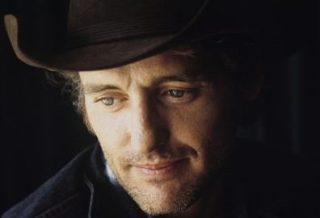Future Cinema, creators of the acclaimed Secret Cinema, presents a very special screening tribute to the late, great Dennis Hopper with a unique screening of David Lynch’s 1986 cult classic Blue Velvet on Saturday 31st July. A maverick, a renegade, a debauched hell-raiser – there are a long list of names that would aptly characterize the life and career of Dennis Hopper, a craftsman who along with other Hollywood greats had a rich and vastly dynamic career in moving images. But perhaps the actor, filmmaker and above all else – artist, who passed away on the 29th May this year aged 74, will, for many film buffs be best remembered for the 1969 iconic road movie, Easy Rider, in which he starred and directed.
As a young man, Dennis Lee Hopper became interested in acting and eventually became a student of the Actors’ Studio. Making his television debut in 1954, he shortly went on to appear in two films featuring James Dean; Nicholas Ray’s melodramatic masterpiece Rebel Without a Cause (1955) and George Stevens’ 1956 feature, Giant.
Hopper had commented that working with Dean had completely changed his outlook on acting, and he very much idolized and adored the tragic Hollywood actor – famously taking on board Dean’s method acting mantra “…just smoke the cigarette, don’t act like you’re smoking a cigarette.” During the next 10 years, Hopper appeared frequently on television in guest roles, and by the end of the 1960s had played supporting roles in several films.
In 1968, Hopper teamed up with another young up-and-coming actor, Peter Fonda, to produce the screenplay for Easy Rider, a film that was destined to become one of Hollywood’s great counterculture pictures. Filming was fraught with difficulties and Hopper consistently clashed with his crew and co-star Fonda. This was perhaps aided by Hopper feeling the effects of an increasing intake of drugs and alcohol, not helped by the fact that the drug taking and drinking scenes in the film featured the real substances. This was soon to become an affliction that unbeknown to Hopper would shape the path for the next 15 years of his career.
Furthermore, not only was the film a critical success, it was also a commercial success, being made for less than $400,000 yet taking more than $40 million at the box-office. Hopper’s parable of the American dream, which captured the national imagination, not only became a touchstone for a generation and a cinematic sensation but also made Hopper – briefly – the most bankable director in Hollywood.
Easy Rider’s success led to Hopper getting the chance to direct again, this time with complete artistic control. However, his next feature, 1971’s The Last Movie proved to be a critical and commercial failure, effectively ending Hopper’s directorial career for well over a decade, and alienated him from the rest of Hollywood.
The late 1980s would bring him perhaps one of the most memorable villainous roles in cinematic history, that of the psychotic Frank Booth in David Lynch’s neo-noir classic Blue Velvet (1986). Hopper’s comeback was consecrated with his astonishing portrayal of the disturbing kidnapper Frank, offering a truly horrific performance with a soupçon of real horror as its foundation; apparently, he called David Lynch after initially reading the script and said casting the demonic antagonist would be no problem as “I am Frank Booth!”
This role as a crazed, drug-dealing sadist was followed with an antithetically subdued, heart-felt performance as an ashamed dad seeking redemption in David Anspaugh’s Hoosiers (1986) in the same year, a role which brought Hopper a nomination for Best Supporting Actor at the Academy Awards. It was clear that the once down-and-out actor was returning to form, becoming universally re-recognized as a sublime talent. In the following years Hopper worked relentlessly, though his films were uneven in quality. Notable appearances included playing a darkly comic maniac in the nauseating Keanu Reeves vehicle, Speed (1994), a film which perhaps has the most profound line in cinematic history, Annie Porter’s (Sandra Bullock) “I’ve got gum on my seat, gum”, and commendable television appearances in such shows as 24.
Future Cinema presents Blue Velvet, a tribute to Dennis Hopper
About Future Cinema
FUTURE CINEMA, the creators of Secret Cinema, creates large scale cinematic experiences, fusing feature film with music, theatre and live performance. The company is famed for taking audiences on multi-sensory rides that have become genuine ‘Don’t Miss’ events. In addition to its own events, Future Cinema also organises experiences for third parties, including premieres, award ceremonies and live music events. It also acts as an agency, providing a full range of performance artists and other event related personnel.
For more information contact press@futurecinema.co.uk





